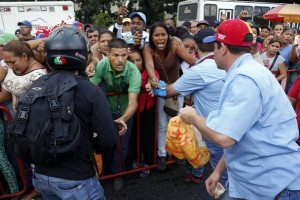![Venezuelan President Nicolas Maduro. Photo by Cancillería del Ecuador [CC BY-SA 1.0 (http://creativecommons.org/licenses/by-sa/1.0)], via Wikimedia Commons](http://occupyworldwrites.org/wp-content/uploads/2015/03/President_Maduro_diciembre_2014-232x300.jpg)
Venezuelan President Nicolas Maduro. Photo by Cancillería del Ecuador [CC BY-SA 1.0], via Wikimedia Commons
That is, unless you live in a country that derives 95% of its economy from oil. We’ve talked about Venezuela on several occasions, and in one of our more recent articles, we discussed the collapse of the Venezuelan economy and the causes of the collapse. The effects of the drop in oil prices on an economy that was already struggling has been catastrophic.
During the years that Hugo Chávez was in power, he instituted large, sweeping social programs aimed at elevating the economic status of the poorest Venezuelans. What paid (and still pays) for these programs? Oil, or to be more specific, petrodollars from China in exchange for oil. When the bottom fell out of the oil market, the Chinese naturally started paying less for the oil. So, as the international price of oil fell, so did the living conditions of the people of Venezuela.
This leaves the Venezuelan government facing a huge challenge; the Venezuelan government must repay $12 billion to foreign creditors by the end of the year. Another $16 billion comes due in 2016. The previously expected oil revenues are half of what they were expected to be. And, it’s the citizens who suffer.
The contrast between us living here in America and the citizens of Venezuela couldn’t be sharper. Americans happily fill up their gas tanks and think all is well in the world and things are as they should be. We have essentials such as toilet paper. We can go out at practically any time day or night and stop for fast food, go shopping and enjoy movies.
Compare this to Venezuela, where the citizens stand in lines for hours on end for basic supplies like corn, flour, toilet paper and bread. There’s armed guards that prevent anyone from going out after 6 pm.
So, what is the US doing to help allay this humanitarian crisis in a country so close to home? What it always does; impose sanctions. President Obama is now “deeply concerned by the Venezuelan government’s efforts to escalate intimidation of its political opponents” and that the country now poses “an extraordinary threat to the national security” of the U.S. — a declaration necessary to legally justify the sanctions. The sanctions are levied against 7 top officials of the Venezuelan government.
Josh Earnest, the White House press secretary, said in a statement on Monday: “Venezuelan officials past and present who violate the human rights of Venezuelan citizens and engage in acts of public corruption will not be welcome here, and we now have the tools to block their assets and their use of U.S. financial systems.”
Diosdado Cabello, president of the Venezuelan National Assembly, had a different opinion, needless to say. “Does Venezuela represent a threat to the United States? By God! It’s them! They’re the ones who represent a threat not only to Venezuela, but the whole world. I hope that these are the last gasps of imperialism and that the world understands that the world’s empires should end.”
Frankly, we’re aren’t surprised that our government imposes sanctions against Venezuela for human rights violations, yet remain silent about the far worse violations that happen on a daily basis in Saudi Arabia. Why? Because Venezuela is one of the few major oil producing nations that refuse to bow to our wishes. Which brings us to the wild card in all of this – Russia.
Back in December, Russian Defense Minister Sergey Shoigu announced an agreement with Venezuelan President Nicolas Maduro on “a broad range of issues linked to military and military-technical cooperation.” Russia is the main supplier of weapons for Venezuela, and the agreement covers such things as bilateral military exercises. Last month, top officials from Russia, Venezuela, and Ecuador met in Moscow to discuss possible measures they could take to stabilize the world price of oil.
Yesterday, the Russian government released a statement accusing the US of exerting political pressure on Venezuela with the objective of destabilizing its democratically elected government:
“We are aware with great concern of the increase in negative tendencies and the destabilization attempts against Venezuela, a country that is united with Russia by very close friendship ties and through a strategic association. Washington’s aggressive build-up of political and sanctions pressure on Caracas – to the extent of declaring the domestic political situation in Venezuela ‘an extraordinary threat to the national security and foreign policy of the United States’ – is openly discordant with the positions of many other members of the international community, who call for a constructive solution to Venezuela’s internal problems,”
Once again, a nation’s been reduced to being a pawn in a geopolitical chess game; one with no clear winners. And once again, it’s the people who suffer, through no fault of their own. There are no easy answers to what faces Venezuela in the days ahead, but we do know that the people deserve better than this.
Editorial note; this article was a joint collaboration between ew and MNgranny.


